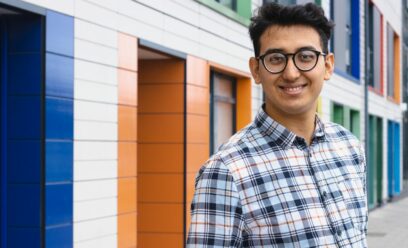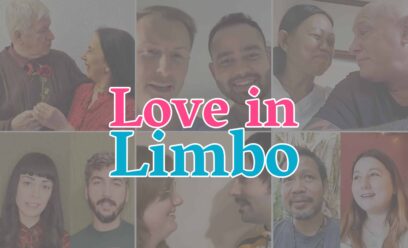‘I lived in a constant limbo of stress’: how the UK asylum system can affect your mental health
Posted by IMIX on October 7, 2022For World Mental Health Day, 26-year-old campaigner Zain Hafeez talks about how growing up in the asylum system for 10 years affected his mental health, and how he is on the path to healing.

Zain Hafeez
My experiences as a student in the UK asylum system
By Zain Hafeez
I moved to the UK at the age of 12 and experienced first-hand the brutal and disdainful immigration process for more than 10 years. The culture shock, the stress of living in a constant state of limbo and uncertainty regarding my immigration status had a profound impact on my mental health.
The restrictions imposed on me, not being allowed to work, vote travel abroad, drive, not being able to pursue my education beyond A levels – taken together these things made me question everything from my religion, culture and even delve into deep questions of identity such as ‘Who am I?’
My lowest point came in 2018 when I was forced to give up my place at university. I was unable to afford the fees and, because of my immigration status, not eligible to receive a student finance loan. I had worked extremely hard and excelled in my A levels, I simply wanted to attend my chosen university to study Business, but this was stripped away from me. I felt incredibly low and lost my motivation to study.
I had to supress my emotions to survive
As time passed, I conjured up the will power to do something about my circumstances; I decided to start examining my own thoughts and feelings. I realised that I was pursuing a degree in Business for the sake of it – the result of me being controlled by my traumas and supressed emotions, which I had pushed into the depths of my subconscious mind.
Suppressing emotions was a coping strategy that had helped me to survive previously. I started being honest with myself and realised that I was ‘minimising’ my experiences of feeling constant discomfort and paranoia due to my status by reframing it for myself in a less painful way to cope with the constant stress.
The result of repressing the pain and burying it in my subconscious mind caused me to be compulsive and do things which I didn’t even value in order to escape from myself and the pain I had repressed.
Eventually, I regained my motivation to study and successfully applied for a Sanctuary Scholarship, receiving a first-class honours degree in philosophy and global studies.
As someone with first-hand experience of the setbacks and detrimental impact of the brutal immigration process, I consciously decided to campaign on these critical issues, which are neglected and misrepresented in the mainstream media, resulting in the stigmatisation of migrants and a hostile attitude towards these vulnerable individuals
However, the issue of mental health transcends the struggles of migrants and is critical for everyone.
The next section is somewhat philosophical, but please bear with me.
I was able to heal after finding my ‘blind spot’
During my philosophy degree, I learnt that there are three types of knowledge. Firstly, there is what I know; for instance, I know that 2+2=4. Secondly, there is what I know that I don’t know; I know that I don’t know what the exact temperature is in Peru right now. Finally, the third is what I don’t know that I don’t know. This is a vital distinction because this blind spot is present for all humans. It contains information which is out of our awareness but has a significant impact on our behaviours and compulsive attitudes.
Finding out what is hidden in my blind spot through therapy and introspection has changed my life completely and made me go through a paradigm shift. Despite all the restrictions and the adversities which I was facing, delving into this blind spot and realising some harsh truths about myself enabled me to keep pushing, made me stronger and gave me courage.
As a result, I not only achieved a first-class honours degree but have had a boxing fight at King Power Stadium in Leicester generating more than £8000 for Cancer Research, I have been campaigning for the rights of asylum seekers and raising awareness of the psychological implications of going through the immigration process as a Voices ambassador. I also co-lead a national campaign and work as a Team Leader for a charity.
I want the reader to take away from my experiences, to know that accessing this blind spot exists in all of us through therapy and introspection. And that it can help anyone regardless of whether they’re suffering from intense traumas or not.
It contains deep secrets behind our procrastination to our self-sabotaging behaviours that hinder us to be the best version of ourselves. As Carl Jung states: ‘Until you make the unconscious conscious it will direct your life and you will call it fate.’
I recognise that not everyone has access to private therapy, but help exists. If you are experiencing mental distress, please contact your GP, contact a loved one or call one of the helplines below.
If you are experiencing mental or emotional distress, please seek help from your GP. If you experiencing an emergency, please call 999.
You can call NHS at 111, for when you need immediate help but you are not in danger.
The SHOUT crisis helpline – text SHOUT to 85258
Call Samaritans at 116 123.
Zain Hafeez is a Community Organiser and a Team Leader at Citizens UK where he supports asylum seekers, victims of domestic abuse and modern slavery. He is a spokesperson on issues of asylum and refugee rights, as someone with lived experience of the system as a teenager.
You can follow him on Twitter and Instagram.



